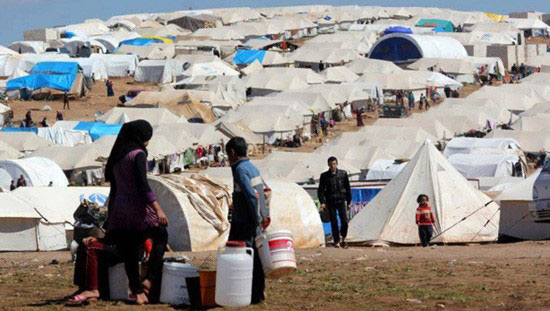
The war in Syria and the refugee crisis it has caused is "the crisis of the century" according to Luciano Calestini, and eclipses Afghanistan, Iraq and the Congo. "What makes this conflict different from all the others," said Calestini, the deputy head of UNICEF in Beirut, Lebanon, and a 17-year veteran of humanitarian crises around the world, "is that there is no process in sight for negotiation, no table that people are sitting around...The Syrian crisis is more intractable, and its impact, its tentacles, are spreading across the entire world."
UNICEF - the United Nations Children's Fund - has a mandate to protect children. In Syria, "children, as is always the case in a war, are paying the highest price for a conflict they did not start and did not ask for." There are 4.1 million refugees living outside Syria - most are in Turkey (2 million), Lebanon (1.1 million), Jordan (500,000-600,000) and Iraq (200,000-300,000). "Imagine how bad things must be if you flee to Iraq!" said Calestini. 53% of the refugees in Lebanon are children, and after four years of war their lives are stagnating.
Most Syrian adult refugees are not allowed to work under Lebanese law. Families receive at most $200 in international humanitarian aid per month - and the minimum needed to survive is about $400 a month. So the refugees face the tough challenge of having to make up the shortfall. Adults leaving their camps to seek work get arrested at checkpoints and thrown in jail for a few days. "So they send the children out to work, mostly in the fields, for 10, 12, 14 hours a day," said Calestini. Or they send their boys, some as young as 12 or 13, to go back into Syria to fight against the Assad government - in exchange for $300-$400 a month. Worse still is the emerging phenomenon of "early marriage", which the UN calls more directly "child marriage" - where girls as young as 9 and 10 are being married to Lebanese men in exchange for the going rate of $2,000-$3,000. Horrific as it sounds, in many cases Calestini says the girls may have more protection being married to one man than hanging around the refugee camps.
"This is the first time I have been in a crisis where UNICEF has put up its hands and said 'we cannot reach every child.' All the other crises I have worked in, UNICEF has always said we will never leave a single child behind," said Calestini.
When the Syrian refugees first started arriving in Lebanon four years ago, ordinary Lebanese families took them into their own homes to give them shelter. "But those days are gone now," said Calestini. "Frankly, there is a limit to Lebanese generosity." Lebanon itself is under tremendous pressure - although it has the largest number of billionaires in the world per capita, at the same time one-third of the Lebanese population lives in poverty - "it is a very fragile society. And the 1.1 million Syrian refugees account for 20% of the entire population of Lebanon - one refugee for each four Lebanese - it is crazy," said Calestini. Nobody wants Syrians in Lebanon anymore, "so the de facto policy is to make it as hard as possible for Syrian refugees, so they will go elsewhere," said Calestini. This is one of the reasons for the increasing flow of refugees north to Europe this summer. "Syrians have started leaving Lebanon in numbers we haven't seen before... Wherever I go in the camps these days, people say 'if we could go, we would'," said Calestini. They know the risks of drowning at sea on the way to Europe, but "they say they would rather risk a fast death at sea than a slow death in the camps." And, says Calestini, there is an undeniable element of Schadenfreude in Lebanon watching Europe now starting to deal with the refugee problem that Lebanon has had for four years.
But it is clear the solution is not more humanitarian aid or more resettlement - the European pledge to accept 120,000 refugees this summer is a mere fraction of the 4 million refugees who are now giving up on the hope of going back to Syria anytime soon. The only solution will be to put an end to the conflict - but with Obama and Putin at loggerheads, the brutal leaders of ISIS not interested in talking to anyone, and even the more moderate Syrian opposition so splintered that it is not clear if anyone can speak on their behalf, Calestini said "my crystal ball is broken" when it comes to seeing a way out of the crisis.
UNICEF appealed for $6.5 billion to fund their operations in and around Syria this year. So far they have only received 40% of that, and as Calestini asked, "how much longer will the international community respond to annual multi-billion dollar appeals?"
